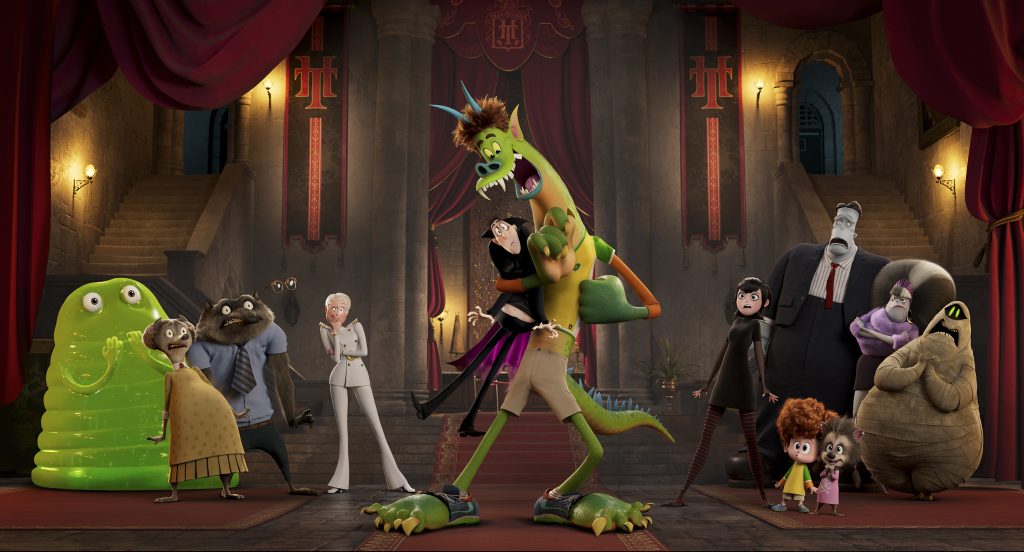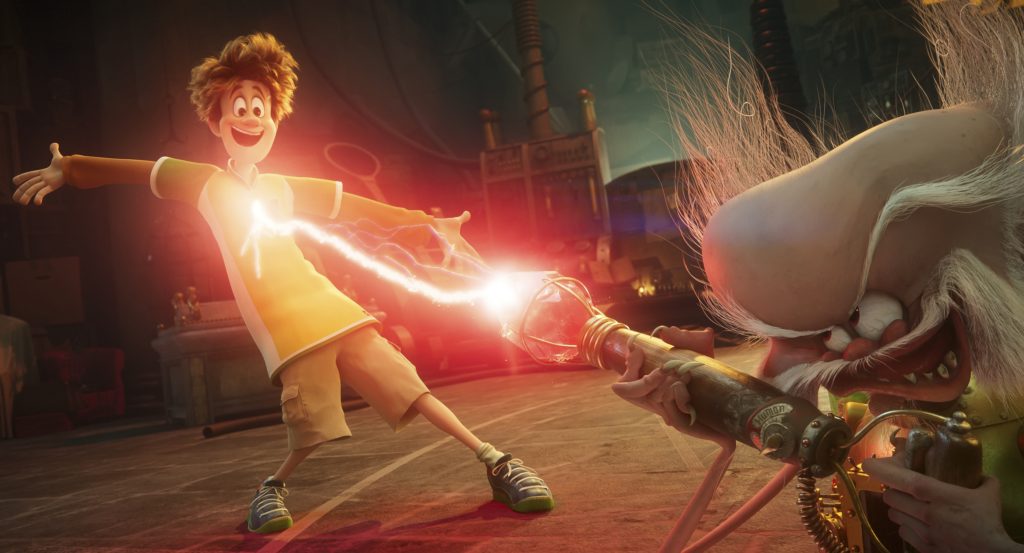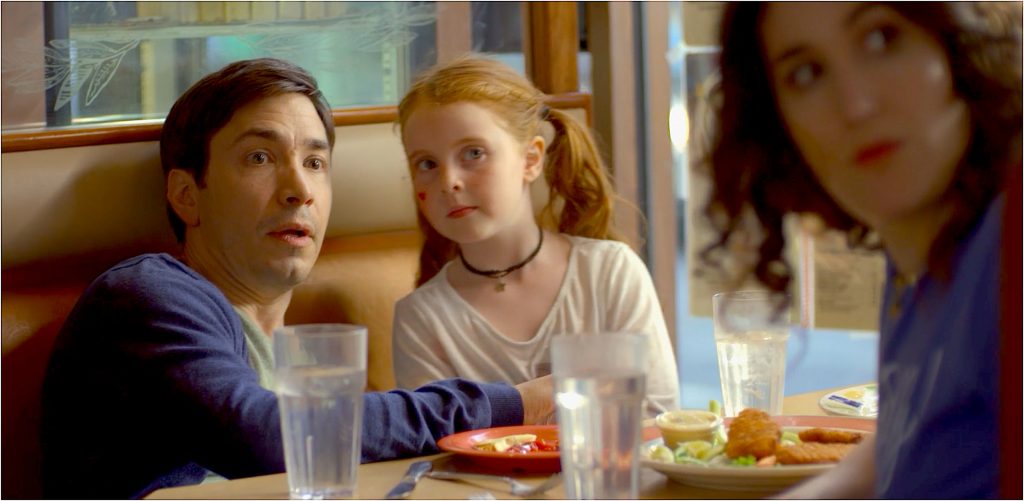January 14, 2022
by Carla Hay

“Hotel Transylvania: Transformania”
Directed by Derek Drymon and Jennifer Kluska
Culture Representation: Taking place in Transylvania and South America, the animated film “Hotel Transylvania: Transformania” features a predominantly white cast of characters (with one African American and two Latinos) depicting monsters and humans.
Culture Clash: Count Dracula is ready to retire and pass Hotel Transylvania along to his daughter Mavis, but a mishap with Van Helsing’s invention changes Mavis’ human husband Johnny into a monster and Dracula and his monster friends into humans.
Culture Audience: Aside from obviously appealing to “Hotel Transylvania” movie series fans, “Hotel Transylvania: Transformania” will appeal mainly to people who are interested in lightweight animated films with cliché-ridden and predictable plots.

It’s never really a good sign when a movie studio takes a sequel film from one of its most popular franchise series and sells it to a streaming service. It usually means that the movie is considered not commercially appealing enough for the studio to release the film. It’s also not a good sign when two of franchise’s biggest stars decide not to be part of this sequel.
That’s what happened when Sony Pictures Animation dumped “Hotel Transylvania: Transformania” (the fourth movie in the “Hotel Transylvania” hotel series) by selling it to Amazon, which is releasing it on Prime Video. (China is the only country where Sony will release the film in theaters.) It’s easy to see why Sony thought this movie was substandard. It’s also easy to see why original “Hotel Transylvania” franchise stars Adam Sandler and Kevin James took a hard pass on being involved in this movie, whether it was because they weren’t going to paid what they wanted and/or legal issues. (Sandler and James both have lucrative movie deals with Netflix.)
Genndy Tartakovsky—who directed the first three “Hotel Transylvania” movies and co-wrote 2018’s “Hotel Transylvania 3: Summer Vacation”—co-wrote “Hotel Transylvania: Transformania” with Amos Vernon and Nunzio Randazzo. The first two movies in the series are 2012’s “Hotel Transylvania” and 2015’s “Hotel Transylvania 2.” Derek Drymon and Jennifer Kluskais directed “Hotel Transylvania: Transformania,” which is not a completely terrible movie. But in terms of its story, the movie is lazy and not very interesting.
As the fourth movie in the series, “Hotel Transylvania: Transformania” had the potential to go on an original adventure with the franchise’s well-established characters. Instead, the movie is filled with over-used clichés that have already been in other films. “Hotel Transylvania: Transformania” is essentially a not-very-funny comedy with this not-very-original concept: Two characters with opposite personalities are forced to travel together and find out how much they have to rely on each other in order to reach a shared goal. Relationships and characters that could have been developed are ignored or shoved to the margins of the story. The ending of the movie is also kind of weak and abrupt.
“Hotel Transylvania: Transformania” is also one of those sequels that doesn’t adequately explain some of the backstories of some of the main characters. If people need to watch one movie to prepare for “Hotel Transylvania: Transformania,” it should be “Hotel Transylvania 3: Summer Vacation.” That’s the movie that introduced monster hunters Van Helsing (voiced by Jim Gaffigan) and his sassy great-granddaughter Ericka (voiced by Kathryn Hahn), who started off as enemies to the “Hotel Transylvania” protagonists and ended up becoming their friends. And in Ericka’s case, more than friends, because she and widower Count Dracula fell in love with each other.
The voice of Count Dracula was originated by Sandler in the first three “Hotel Transylvania” movies. In “Hotel Transylvania: Transformania,” Dracula (voiced by Brian Hull) and Ericka (who is a human) are now happily married, but it’s barely explained in this sequel how they got together. The prejudice between monsters and humans, which fueled much of the conflicts in the previous “Hotel Transylvania” movies, is only used as a flimsy plot device in “Hotel Transylvania: Transformania.” Dracula’s vampire daughter Mavis (voiced by Selena Gomez) is married to a human named Jonathan, nicknamed Johnny (voiced by Andy Samberg), who’s had a hard time getting reluctant acceptance from Dracula, who thinks Johnny is too goofy for practical-minded Mavis.
But now that Dracula is married to a human, “Hotel Transylvania: Transformania” does not do anything to explore this new aspect of Dracula’s life. Instead, the movie’s story goes back to Dracula disapproving of Johnny, which was the basis of the first “Hotel Transylvania” movie, when Johnny and Mavis began dating and fell in love with each other. In “Hotel Transylvania: Transformania,” Johnny and Mavis have been married for several years and have a son named Dennis (voiced by Asher Blinkoff), who is about 8 or 9 years old and who has very little screen time in the movie.
In “Hotel Transylvania: Transformania,” Dracula still owns and operates Hotel Transylvania (a hotel for monsters), but he wants to retire so that he can have more time to spend with Ericka. Dracula has decided that he is going to give ownership of the hotel to Mavis and Johnny. Mavis, who has hearing superpowers, overhears Dracula telling Ericka about his retirement plans, which he says he’s going to announce at the hotel’s 125th anniversary celebration.
Mavis is excited to find out that she and Johnny will be taking over ownership of the hotel. She tells Johnny, who’s also elated. Johnny immediately comes up with ideas of how he’s going to change the hotel.
When Johnny enthusiastically shares these ideas with Dracula, his father-in-law is so turned off, he changes his mind about wanting Johnny to co-own the hotel. Instead of telling the truth about why he changed his mind, Dracula lies to Johnny by telling him that there’s an ancient law that says hotels for monsters can only be owned by monsters. At the hotel’s 125th anniversary party, Dracula lies to everyone and says his big announcement is that the hotel will get a new restroom in the lobby.
A dismayed Johnny then asks for help from Van Helsing, who has been living as a retired eccentric who tinkers with inventions. Van Helsing has an invention called a Monsterfication Ray, which can turn humans into random monsters. The device looks like a long ray gun with a giant crystal as its source of power. Van Helsing uses the Monsterfication Ray on Johnny, who is turned into a giant green monster resembling a dragon. Even though his physical appearance has drastically changed, Johnny has the same personality, and he can still talk like a human.
Dracula is furious about Johnny’s transformation into a monster because he still doesn’t want to give Johnny ownership of the hotel. And so, Dracula angrily goes over to Van Helsing’s place to take the Monsterfication Ray and use it to turn Johnny back into a human. But the plan backfires when Dracula shoots the Monsterfication Ray at Johnny, the lasers on the ray ricochet off walls, and the rays accidentally hit Dracula, who turns into a human being as a result. Much to Dracula’s horror, he is now looks and feels like an old man, with a balding head, a stomach paunch and weaker physical strength.
Dracula’s four closest monster friends—good-natured Frankenstein (voiced by Brad Abrell, replacing James in the role), worrisome werewolf Wayne (voiced by Steve Buscemi), fun-loving mummy Murray (voiced by Keegan-Michael Key) and sarcastic invisible man Griffin (voiced by David Spade)—have all witnessed this debacle. Dracula is terrified about Mavis finding out about him turning into a human and Johnny into a monster. Dracula orders his friends not to tell Mavis.
Somehow, when Dracula used the Monsterfication Ray, the device got broken, and the crystal no longer works. Van Helsing says that the crystals used for the Monsterfication Ray are extremely rare. Through a tracking device, Van Helsing finds out that the nearest crystal is in South America. Guess where Dracula and Johnny are going for most of the movie?
Meanwhile, a poorly written part of the movie has Frankenstein, Wayne, Murray and Griffin turning into humans too. It’s shown in an awkward scene where the hotel’s DJ—a green blob called Blobby (voiced by Tartakovsky)—gives the four pals a drink that has something in it which automatically turns them into humans. Blobby consumes the drink too, but he’s just turn to a green gelatin mold.
Frankenstein changes into a vain “hunk” with a tall and muscular body, Wayne transforms into a very hairy man, and Murray becomes an old man with rolls of body flab. Griffin is exposed as someone who only wore eyeglasses, so he’s naked the entire time that he’s human. Griffin’s nakedness is used for some dimwitted comedy in the movie.
Just like Dracula and Murray, Griffin is horrified that he looks old and out-of-shape as a human. This movie has not-so-subtle and problematic messages that looking like an elderly human being is a terrible fate that should be avoided at all costs. It’s the closest reason to explain why Frankenstein suddenly becomes an egotistical jerk over how he looks as a young and virile human being. This drastic personality change still comes across as too phony, and it doesn’t serve the story very well.
Mavis, Ericka, Frankenstein’s shrewish wife Eunice (voiced by Fran Drescher) and Wayne’s loving wife Wanda (voiced by Molly Shannon) find out that Dracula and Johnny have gone to South America. And so, Mavis, Ericka, Eunice, Wanda, Frankenstein, Wayne, Murray, Griffin and several of Wayne and Wanda’s werewolf kids go to South America to find Johnny and Dracula. It’s never really explained why some but not all of the werewolf kids (Wayne and Wanda have dozens of children) are along for the ride or why these kids even need to be there in the first place.
Meanwhile, much of “Hotel Transylvania: Transformania” shows repetitive mishaps that Dracula and Johnny go through as they wander around Amazon River areas in South America in search of the crystal. Dracula has a hard time adjusting to life as a human. He no longer has to fear being in the sunlight, but he’s frustrated that he gets tired, thirsty and sweaty on this grueling trip. When he jumps into a waterfall that Johnny warns could be dangerous, Dracula gets bitten by several piranhas and is shocked that he can’t recover quickly from these injuries.
Johnny is the same cheerful goofball, but he still gets on Dracula’s nerves. Dracula is also jealous that Johnny now has more physical strength than Dracula does. It goes on and on like this for too long in the movie. As an example of how “Hotel Transylvania: Transformania” stretches out the banality, there’s a scene with Johnny singing a Spanish version of Wham!’s “Wake Me Up Before You Go-Go” during a bus ride that Johnny and Dracula take with some local people. It’s intended to be hilarious, but it just comes across as dull and cringeworthy.
Visually, “Hotel Transylvania: Transformania” does nothing special, although the movie makes good use of vibrant hues in the outdoor South America scenes. The cast members’ performances are adequate. Thankfully, movie clocks in at just 98 minutes, but the story is filled with too many recycled tropes of two opposite personalities stuck together on a road trip; the hunt for a treasured item; and the central characters being chased by people who want to find them.
“Hotel Transylvania: Transformania” doesn’t have much use for the adult female characters, who basically just worry about and react to what their husbands are doing. And because Dracula is separated from his four closest monster pals for most of the movie, that friendship rapport is largely missing from “Hotel Transylvania: Transformania.” This rapport was one of the highlights of previous “Hotel Transylvania” movies.
The movie shows almost nothing about what Dracula is like as a grandfather to Dennis. Wayne and Wanda have a daughter named Winnie (voiced by Zoe Berri, replacing Sadie Sandler in the role), who is Dennis’ best friend/love interest, but that relationship is also essentially ignored in the movie. Instead, some the werewolf children, who do not have names or individual personalities, get unnecessary screen time when they tag along during the trip to South America.
Some people might enjoy “Hotel Transylvania: Transformania” if they want to see another “Hotel Transylvania” movie about Dracula and Johnny trying to navigate their tension-filled relationship. “Hotel Transylvania: Transformania” is being marketed as the final movie in the “Hotel Transylvania” series. If that’s true, then the “Hotel Transylvania” movie series is going out with a toothless whimper, not a bang.
Prime Video premiered “Hotel Transylvania: Transformania” on January 14, 2022.

